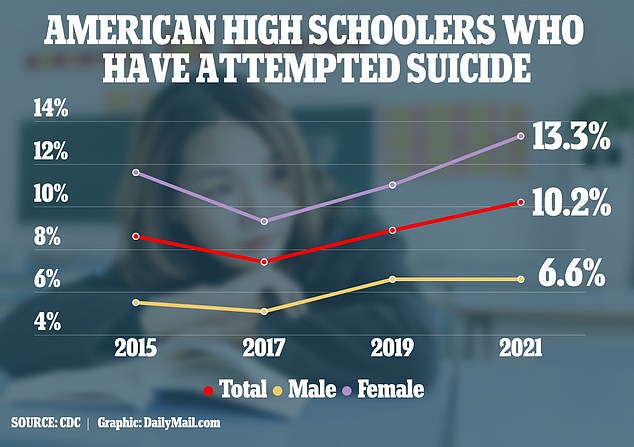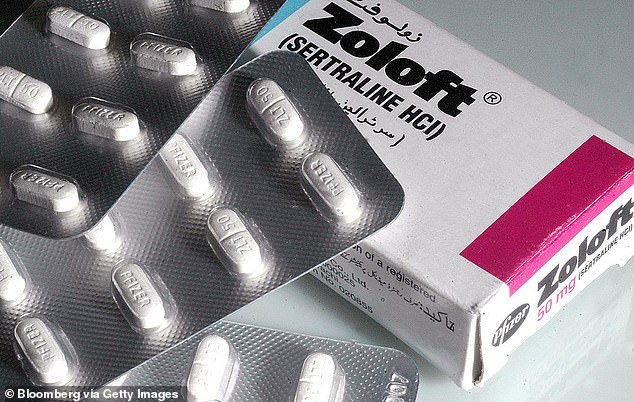Antidepressants could stunt teenagers’ developing sexuality, experts fear
Millions of American teens have benefited from psychiatric medications to treat their depression, without fully understanding the significant effects medications like Prozac and Zoloft have on their still-developing sexual function and libido.
Psychiatrists and other experts have known for years that antidepressants suppress sex drive in adults who take them for a range of mental health problems. Anecdotal reports of users experiencing decreased libido date back to the mid-1990s, shortly after the first generation of drugs hit the market.
Compared to the wealth of research on the long-term effects of antidepressant use on sexuality and a range of other health factors in adults, little has been devoted to studying the drug’s impact on teenage brain development in areas relevant to sexual functioning and their attitude. about sex.
An estimated 89 million Americans ages 12 and older take psychiatric medications for depression, and while the exact figure for teens taking specific medications is difficult to determine, the Centers for Disease Control and Prevention estimates 3.4 percent – the burden of a worsening youth mental health crisis cannot be denied.
Nearly a third of all American high school students report suffering from poor mental health. It comes as some of the country’s leaders say the country is facing a youth crisis. Women suffered the most, with 40 percent reporting poor mental health that year

The CDC found that one in 10 U.S. high school students attempted suicide in 2021, up from 8.9 percent the year before. Women were hit hardest: 13.3 percent attempted suicide that year
About a third of U.S. high school students report persistently poor mental health, while one in 10 have attempted suicide, up from about one in eight in 2019.
The medications prescribed to help teens can be lifesaving, but at the same time they can cause long-lasting and potentially irreversible changes in a teen’s developing brain, reducing their sexual function in adulthood.
Dr. Debby Herbenick, a professor at Indiana University School of Public Health-Bloomington and author of a book on parenting and teen sexuality, told Salon, “Medications work differently in adolescents’ bodies and we need more research to understand adolescents’ experiences with antidepressants.” understand, including any antidepressants. affect their sexual desire (libido), orgasm, erections, ejaculation or genital sensations (these are the types of changes seen in adults).
‘For example, there is research showing that higher SSRI doses have been associated with anorgasmia in adolescents.’

Zoloft and its generic equivalent sertraline are among the most commonly prescribed SSRI medications in the US
If young people’s sexual drive and functioning are compromised in some way during adolescence, it may be more difficult for them to engage in their first sexual relationships and explore their sexual preferences.
They could also miss critical windows for brain development in regions that control sexual health and libido.
The most commonly prescribed type of antidepressant is a selective serotonin reuptake inhibitor (SSRI), which increases levels of the neurotransmitter serotonin in the brain to better regulate a person’s mood and emotions.
Serotonin helps carry a message from one neuron to another and is typically reabsorbed from the gap between nerve cells, called the synapse, after the message has been successfully delivered.
In the brain of someone with depression, serotonin levels are poorly regulated and the feel-good chemicals are reabsorbed too quickly, leaving nothing behind to serve as a chemical messenger between nerve cells.
However, an SSRI blocks that reabsorption, leaving higher levels of serotonin neurotransmitters in the synapse for longer periods of time, improving communication between nerve cells, which regulates mood.
Researchers are still trying to determine what exactly links serotonin and SSRIs to sexual dysfunction, and the true burden of the negative side effect is not yet fully understood, as self-reported feelings of reduced libido vary widely depending on whether a doctor brings up the subject or not. the patient has to do it.
A review of the side effects of this class of medications found that only two to seven percent of patients spontaneously reported sexual side effects with SSRIs to their medical professional, but when people were given a sexual dysfunction questionnaire to fill out, the incidence of sexual dysfunction decreased. dysfunction exploded to 55 percent.
The chances of a doctor asking the teen first seem slim, as Columbia University psychiatrists reported a case of an adolescent boy who took an SSRI for his severe anxiety and worked for a while. But his therapist noticed that the boy was less willing to talk during their sessions.
Only during a follow-up session did the boy admit that he no longer wanted to take the medication because his sexual feelings had disappeared and “he was worried about whether he would ever have sex again.”
The boy was able to work with his doctors to figure out a way to move forward, but the researchers behind the case report note that it shouldn’t have been up to the patient to bring up a common side effect.
They said: ‘The fact that the patient had to give this information of his own volition makes it likely that others, who may feel less comfortable discussing sexual issues, could stop taking the medication without raising this issue with their practitioners. to discuss.’
A possible explanation for the drug’s effects on sex drive is that as serotonin levels rise, they dampen another neurotransmitter key to sexual function, dopamine.
Dopamine is the excitable neurochemical that drives desire and desire. It is the basis of sexual arousal and the pleasurable moments that lead to orgasm. Serotonin, especially in high doses, can blunt the excitatory effects of dopamine, resulting in a lower sex drive.
Large studies with data reflecting the perspectives of patients from across the country were conducted before and after the first SSRIs hit the market in the 1990s.
Yet studies in multiple countries have often overlooked sexual side effects and symptoms, especially in the context of young patients. Could this be explained by the fact that teenagers taking these drugs do not experience the same negative sexual effects as adults? Psychiatrists say no.
Experts have known for at least two decades that teens who take antidepressants experience the same decreased libido and erectile dysfunction as adults.
In 2004, Dr. Alexander Scharko, a child psychiatrist then at Johns Hopkins University School of Medicine, highlighted serious shortcomings in surveillance of drug side effects in adults versus children.
Dr. Scharko reviewed the 21 clinical reviews available at the time that looked at adolescents and SSRIs, and seven unique sets of treatment guidelines.
About a third of those reviews mentioned sexual dysfunction, such as a decreased sex drive. Yet, according to Dr. Scharko, not much has been done to track the number of young people affected by this problem.
He said: ‘If you accept that SSRI-induced side effects generally occur in adolescents at about the same rate as in adults, then it is biologically plausible that the frequency of SSRI-induced sexual dysfunction would also be similar.
‘It is possible that the reduction in libido in adolescents secondary to SSRI use is seen as a benefit by parents and doctors and remains unstated. The actual reasons are unclear, but a simple explanation is that researchers and doctors fail to ask adolescents about sex and sexual functioning.’
Eleven years later, psychiatrists at Columbia University in New York said little had changed since that 2004 analysis.
Those researchers said in their 2015 report: Through our literature review, we discovered that a profound piece of information was missing: the assessment or screening of sexual behavior and dysfunction, resulting in a lack of evidence-based knowledge about these issues in the adolescent population.
‘This was concerning given the high prevalence of sexual side effects in adults taking SSRIs.’
